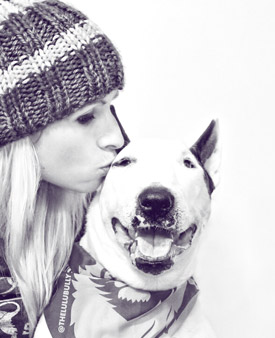STRESS LESS
How does stress effect your dog, and what can you do to manage it?
The Physiology of Stress
For dogs and humans alike, the most prolific hormone released during times of stress is cortisol; often referred to as ’the stress hormone’. Cortisol compromises normal physiological processes at many levels and weakens the immune system by confusing the natural process of t-cells. Cortisol’s ability disruption digestion, inhibit normal elimination of toxins and prevent normal immune response can render those suffering from chronic stress particularly vulnerable to illness, allergies and infection.
During periods of increased stress, “the immune cells are being bathed in molecules which are essentially telling them to stop fighting,” according to Dr. Esther Sternberg. These molecules, namely cortisol, suppress the immune system and inflammatory pathways, rendering the body more susceptible to disease.
High levels of stress, even over relatively short periods and in vastly different contexts, tend to produce similar results: prolonged healing times, reduction in ability to cope with vaccinations, and heightened vulnerability to viral infection (21). The long-term, constant cortisol exposure associated with chronic stress produces further symptoms, including impaired cognition, decreased thyroid function, and accumulation of abdominal fat, which itself has implications for cardiovascular health. The bottom line is that both episodes of acute stress and more prolonged stressful circumstances precipitate lower levels of general health, and exposure to such stress should be minimized.
(Source: http://dujs.dartmouth.edu/fall-2010/the-physiology-of-stress-cortisol-and-the-hypothalamic-pituitary-adrenal-axis#.VpsBnTY_VWk)
Common Stressors for Dogs
Negative stressors are things that cause a physical reaction while provoking negative emotions, such as fear, defensiveness, or anxiety. These vary for every dog, but may include thunderstorms, separation or loneliness, vet visits or procedures, travel, small children, fireworks, sirens, punishment, not knowing their place in the pack, or living in a negative environment (ie. discord between members of their pack).
It may seem strange, but just as there are negative stressors there are also positive stressors. Over-excitement is a big one, and a state that most bull terrier owners know well! Excessive, prolonged, acute excitement (even if it’s happy excitement) can be hard on your dog’s body. For humans, things like riding a rollercoaster, winning the lottery, or skydiving might induce positive emotions, but can be simultaneously stressful on our nervous systems. Just as our bodies aren’t designed to deal with that type of heightened level of excitement on a daily basis, similarly, dogs aren’t designed to deal with things that get them overly excited every day.
How to know if your dog is stressed? Learning to understand a dogs body language is extremely helpful when recognising stress in sensitive dogs, and subsequently being able mitigate that stress before they get overwhelmed. One of the first things to understand is displacement behaviour. Displacement usually occurs when an animal is torn between two conflicting drives, such as fear and aggression, or anxiety and excitement. Displacement behaviour often consist of comfort activities such as grooming, scratching, drinking, or eating. Obsessive licking or chewing of paws, persistent chewing of a bone or toy (or other found object) are just a few of the signs that your dog is likely experiencing elevated stress levels. Displacement behaviour is similar to dissociative behaviour in humans in that it can be the precursor to obsessive compulsive behaviour patterns. Bull Terriers, as a breed are particularly prone to obsessive behaviours like licking and tail chasing. Mitigating their stress levels along with some positive training can go a long way toward curbing these types of potentially damaging behaviours and promoting a balanced mind and nervous system.
Dog body language is a fascinating subject. Even with a just a little study it’s amazing the tools you can pick up to strengthen your bond and understanding with your dog.
There are many other signs, behavioural and physical, that can indicate your dog may be stressed, such as: peeing or marking inside, ignoring or avoidance (ie. of other dogs, small children etc), abnormal behaviour, skin problems (ie. eczema, dermatitis, shedding), foot sores, wide eyes (in our house we call it ‘the crazy eyes’), excessive salivation (drool), fast panting, obsessive play, paw sweat, barking, loss of appetite, or reluctance to engage with you. There might be other signs you can identify that are unique to your dog. I find it’s really good to remind myself, when a dog acts out or misbehaves, to first look for signs of stress and do my best to modify my reaction with that understanding. Remember, dogs intrinsically love to please, so when they do act out it’s generally a sign that they’re having a tough time handling something. And I know from my own experience with stress, the last thing you need is someone yelling at you! A little understanding goes a long way.
Stress Relief and Nervous System Support for Dogs
Understanding and identifying stress and mitigating the causes as much as possible is the foundation to a happy, stress-free life for your dog. But it’s almost impossible to eliminate stress completely – there’s always the things that have to be done (like travel, trips to the vet etc) and the spontaneous happenings that are quite simply out of our control. Supporting a dog’s nervous system with natural supplementation is a really great way to help them roll with the punches and cope with unavoidable stresses.
In recent years all sorts of canine stress relief products have popped up on the market – from homeopathic remedies and herbal tinctures to anti-stress apparel and sprays synthesising the pheromones of whelping mothers. Yet it’s funny how the best things often turn out to be simplest! The magnesium malate I add to Lulu’s food daily for muscle function and heart health is also a wonderful nerve tonic and (as I know from using it myself) really helps takes the edge off stress and anxiety. So, aside from the 650mg I give her morning and evening as part of her diet, I’ll often give her a little extra (it’s quite safe and gentle on the stomach) prior to events that I know will cause her stress.
Another really good supplement we’ve found a powdered natural blend of herbs, vitamins, minerals and amino acids called ‘Calm’ by Australian company Pet Ark.
PetArk’s Calm formula assists in the maintenance of normal muscle and nerve function and contains a range of nutrients that have a role in assisting the transmission of nerve impulses. A daily dose of this beautifully balanced blend of B vitamins, essential minerals, chamomile, hops, passionflower and tryptophan (the natural serotonin-promoting amino acid found in turkey) can support learning, attentiveness and happiness and provide relief from separation anxiety, anxiety-based mis-behaviour and OCD behaviour. PetArk’s Calm powder is an amazing natural remedy for the natural stresses of dog-life (of which bull terriers, and their wonderfully unique minds, can be particularly prone).
On days when she’ll be traveling, visiting the vet, left on her own, or have to deal with any other potentially stressful situation, I’ll add 1/4 tsp to her meal. PetArk’s Calm power is safe (and beneficial) for long-term use. After using this amazing blend for almost 2 years I wouldn’t ever want to be without it. Lulu is relaxed, attentive, responsive, unfazed by events and situations that would previously find her anxious, she rarely displays OCD behaviours (like licking), exudes happiness and plays with a cheeky joyfulness (rather than the over-excited frenetic play bull terriers often exhibit as a channel for anxiety).
The Calm powder is available online in Australia directly from Pet Ark HERE. One tin lasts a VERY long time – for us it lasts almost a whole year.
If you live outside Australia I’d recommend checking out the PetArk Calm ingredients lists at http://petark.com.au/calm/ and research similar formulas available in your location.


